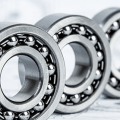Common Causes Of Malfunctioning Porsche Ball Bearings

Common Causes Of Malfunctioning Porsche Ball Bearings
When Porsche ball bearings are cooling down after usage, the contracting lubricant, air or metal may produce a vacuum that should be held via the seals. Should the seals not maintain the vacuum, the sealed hub and bearing will can suck in external air, water and debris. In an area where salt is used in the streets, the effect is equal to ocean water when it comes to the damage the bearings will sustain.
Contaminant Circulation
Once contaminants begin circulating within the grease and among the bearings and races, components will wear out rapidly and in some cases will alter their metallurgy. At this point drivers might detect a wandering steering wheel or loose steering, along with noise which emanates from it. Abnormal wear might also be visible in the front tire treads. Once the bearing becomes worn, the deterioration rate will be accelerated due to seals which are unable to block contaminants, leading to greater heat which will break down and expel lubricants, resulting in a failure which is catastrophic. Seals play an essential role in bearings, and should external contaminants get in, that could produce a pattern of wear which is referred to as bruising. As such, seals should never be reused.
Insufficient Lubrication
Insufficient lubrication is one of the most common causes of bearing failure, along with incorrect adjustment or installation. A bearing issue cannot be successfully resolved until you first understand what is causing it. When it comes to sealed hubs, reviewing the races or internal bearings is not realistic. Instead, think about the roads you commonly used for driving, as well as the loads you carry. Overloading a vehicle is a common mistake that can cause damage to the bearings.
Bearings that become too hot will also heat up the lubricant, which will break it down and lead to etching or scoring on the surface. Additionally, corrosive elements and water can also produce this phenomenon, and lubricant which becomes either oxidized or burned can leave behind a coating which is dark on the surface of the bearing. When a bearing is exposed to extreme heat, the seals or cages themselves may become deformed, which can cause a lockup.
When bearings fail, the damage will usually be sustained to the passenger side first. The reason for this is because the bearings on the passenger side usually have exposure to most of the standing water which is inside a gutter. In the event that the driver side bearings fail first, this means you should immediately inspect the bearings on the passenger side, as they will most certainly fail next.
Compromised Metallurgy
The majority of bearing components will be exposed to heat treatment so that the metal is hardened. However, this treatment is limited in its ability to fully penetrate the metal. In the event that a bearing wears through the layer, deterioration will accelerate within the soft part of the metal, leading to failure. This process is referred to as spalling, and the metal will flake off.
Other articles and publications:
- +1 (844) 601-1500
- 3333 US Highway 1
- www.oemluxuryparts.com



